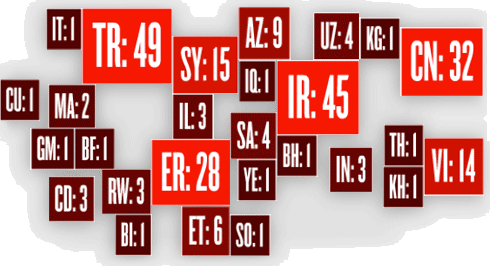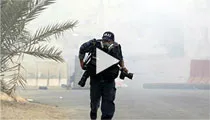With 49 journalists imprisoned for their work as of December 1, Turkey emerged as the world’s worst jailer of the press. Kurdish journalists, charged with supporting terrorism by covering the activities of the banned Kurdistan Workers Party, made up the majority of the imprisoned journalists. They are charged under a vague anti-terror law that allows the authorities to equate coverage of banned groups with terrorism itself. A CPJ special report issued in October found highly repressive aspects of the penal code and anti-terror law, a criminal procedure code that favors the state, and a harsh anti-press tone set at the top levels of government. Intense government pressure caused media owners to dismiss critical journalists and generated pervasive self-censorship throughout the profession. Prime Minister Recep Tayyip Erdoğan, who has filed several defamation lawsuits in recent years, publicly denigrated numerous critical journalists. CPJ conducted three fact-finding and advocacy missions to Turkey in 2012, meeting with journalists, lawyers, diplomats, and Turkey’s justice minister, Sadullah Ergin. CPJ urged Ergin to undertake a case-by-case review of all detained journalists.
Turkey
» Imprisoning 49 in December, Turkey is the world’s worst jailer of journalists.
» CPJ inquiry finds a vast, repressive legal structure, and a harsh anti-press tone.
With 49 journalists imprisoned for their work as of December 1, Turkey emerged as the world’s worst jailer of the press. Kurdish journalists, charged with supporting terrorism by covering the activities of the banned Kurdistan Workers Party, made up the majority of the imprisoned journalists. They are charged under a vague anti-terror law that allows the authorities to equate coverage of banned groups with terrorism itself. A CPJ special report issued in October found highly repressive aspects of the penal code and anti-terror law, a criminal procedure code that favors the state, and a harsh anti-press tone set at the top levels of government. Intense government pressure caused media owners to dismiss critical journalists and generated pervasive self-censorship throughout the profession. Prime Minister Recep Tayyip Erdoğan, who has filed several defamation lawsuits in recent years, publicly denigrated numerous critical journalists. CPJ conducted three fact-finding and advocacy missions to Turkey in 2012, meeting with journalists, lawyers, diplomats, and Turkey’s justice minister, Sadullah Ergin. CPJ urged Ergin to undertake a case-by-case review of all detained journalists.
-
49
Imprisoned on December 1 -
98%
Jailed on anti-state charges -
5
Erdoğan libel suits -
2
Top reporters freed
The government has imprisoned dozens of journalists on terrorism or other anti-state charges, but CPJ's analysis found the evidence relies largely on journalistic activities. A CPJ survey conducted on August 1, 2012, found 61 journalists jailed in direct relation to their work. Between that survey and CPJ's annual worldwide census, conducted on December 1, the authorities released a number of journalists.

| Turkey: 49 Iran: 45 China: 32 Eritrea: 28 Syria: 15 Vietnam: 14 Azerbaijan: 9 Ethiopia: 6 Saudi Arabia: 4 Uzbekistan: 4 | Democratic Republic of Congo: 3 India: 3 Israel and the Occupied Palestinian Territories: 3 Rwanda: 3 Morocco: 2 Bahrain: 1 Burkina Faso: 1 Burundi: 1 | Cambodia: 1 Cuba: 1 Gambia: 1 Iraq: 1 Italy: 1 Kyrgyzstan: 1 Somalia: 1 Thailand: 1 Yemen: 1 |
The vast majority of journalists jailed in Turkey on December 1 were being held on terrorism or other anti-state charges.
74%
Work for pro-Kurdish news media.84%
Had not been convicted of a crime but were being held pending trial or verdict.76%
Jailed in 2011 or 2012.The prime minister has led the anti-press campaign, personally filing several defamation lawsuits against journalists. These actions have fostered self-censorship as news outlets and their journalists, fearful of financial, professional, or legal reprisals, shy away from sensitive topics such as the Kurdish issue and the crackdown on free expression itself.
2005: | Erdoğan sues the publisher of the satirical magazine Penguen for having “assaulted the premier’s personal rights” by depicting him as various animals in cartoons that appeared on its cover. An Ankara court dismissed the case in 2006. |
2006: | The prime minister sues the left-wing daily Günlük Evrensel and its columnist Yücel Sarpdere for defamation. The suit is in connection with an article that altered the lyrics of a favorite song of the ruling Justice and Development Party to criticize Erdoğan’s response to corruption allegations against his finance minister. Erdoğan’s lawyers claimed the article not only insulted the premier but also went “beyond the limits of press freedom.” In 2006, a court awarded Erdoğan US$2,219 in damages. |
2006: | Erdoğan files a defamation claim against Erbil Tusalp, a journalist with the leftist daily Birgün, in connection with a December 2005 article that said government policies were increasingly authoritarian. A domestic court awarded Erdoğan US$5,546 in damages in 2008. Tusalp appealed to the European Court of Human Rights, which ruled in favor of the journalist and ordered Turkey to pay US$6,410 in damages. |
2011: | The premier sues Ahmet Altan, editor-in-chief of the independent daily Taraf, for libel in connection with a January 2011 editorial headlined, “Erdoğan and hollow bullying.” |
2012: | After withdrawing his 2011 complaint against Altan, Erdoğan sues him again, over an editorial that described the prime minister as “arrogant, uninformed, and uninterested” in reform. Erdoğan’s lawyers complain that the editorial was intended to humiliate the prime minister. On December 5, a Turkish court ordered Altan to pay 15,000 lira (US$8,381) in damages to the prime minister. |
Ahmet Şik and Nedim Şener, the highest-profile journalists to be imprisoned in the crackdown, were released on bail in March. Charges of aiding an anti-government plot were still pending against them in late year. The two had spent more than a year in jail before their release. CPJ’s review of the cases found that the government had filed the charges in retaliation for the journalists’ critical investigative reporting. Shortly after their release, each received threats and Şık was criminally charged in connection with his public criticism of the prosecution.
Fusün Erdogan: | The general manager of the leftist outlet Özgür Radyo has been imprisoned since September 8, 2006, on charges of helping lead the banned Marxist Leninist Communist Party (MLKP). She faces a potential life term. The authorities allege she used radio station assets to support the MLKP. The main evidence against her is a document that is alleged to include the names and personal information of MLKP members. According to Erdogan’s lawyer, no evidence connects the document to her client. |
Bayram Namaz: | The columnist for the weekly socialist newspaper Atilim has been imprisoned since September 8, 2006, on charges of possession of dangerous materials, possession of unregistered weapons, forgery of official documents, and attempting to eliminate the constitutional order. As evidence against him, the authorities cited a 2005 article about an MLKP conference that was published in a Kurdish-language journal. Namaz says he did not write the article. |
Mustafa Balbay: | The columnist and former Ankara representative for the leftist-ultranationalist daily Cumhuriyet has been imprisoned since March 5, 2009, as part of the government’s investigation into the alleged Ergenekon anti-state conspiracy. Since February 2011, he has been in solitary confinement. The charges against him include being a member of an armed terrorist organization and attempting to overthrow the government and could result in a life prison term. The evidence against Balbay includes documents seized from his home and office, news stories he produced, wiretapped telephone conversations, and secretly recorded meetings with senior military and government officials. |

